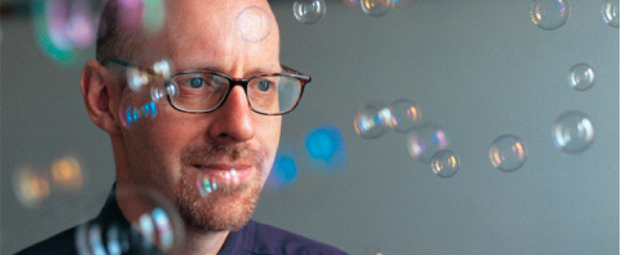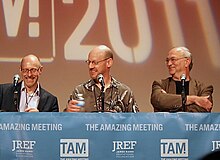
Short Biography
Richard Wiseman holds Britain’s only Professorship in the Public Understanding of Psychology at the University of Hertfordshire. His research has been published in leading academic journals, with one Scientific American columnist labelling him ‘….the most interesting and innovative experimental psychologist in the world today’.
He has written several best-selling popular psychology books that have been translated into over 30 languages, including The Luck Factor, Quirkology, and 59 Seconds. Richard’s YouTube channel has received over 120 million views, and has created more viral videos than anyone else in the UK. He has given keynote addresses to The Royal Society, The Swiss Economic Forum, Google and Amazon.
Finally, Richard was listed in the Independent On Sunday’s top 100 people who make Britain a better place to live, and has acted as a creative consultant to Derren Brown, The MythBusters, and Heston Blumenthal.
Longer biography
Richard Wiseman holds Britain’s only Professorship in the Public Understanding of Psychology at the University of Hertfordshire, where he researches an eclectic range of topics including luck, self-help, illusion and persuasion. This work has been published in the leading academic journals and textbooks, with one Scientific American columnist labelling him ‘….the most interesting and innovative experimental psychologist in the world today’.
Richard has also written several best-selling books that have been translated into over 30 languages, including The Luck Factor, Quirkology, and 59 Seconds. His psychology-based YouTube videos have received over 120 million views and he has created more viral videos than anyone else in the UK. Richard has given keynote addresses to organisations across the world, including The Royal Society, The Swiss Economic Forum, Google and Amazon.
Richard is the most followed British psychologist on Twitter and was recently listed in the Independent On Sunday’s top 100 people who make Britain a better place to live. Over 2 million people have taken part in his mass participation experiments and he has acted as a creative consultant to Derren Brown, The MythBusters, CBS’s The Mentalist, Heston Blumenthal, Nick Cave and Jeremy Deller.
Richard is an Honorary Fellow of the British Science Association and was the 2010 Guest Director of the Edinburgh International Science Festival. He began his working life as a professional magician and is a member of The Inner Magic Circle.Richard Wiseman holds Britain’s only Professorship in the Public Understanding of Psychology at the University of Hertfordshire. His research has been published in leading academic journals, with one Scientific American columnist labelling him ‘….the most interesting and innovative experimental psychologist in the world today’.
He has written several best-selling popular psychology books that have been translated into over 30 languages, including The Luck Factor, Quirkology, and 59 Seconds. Richard’s YouTube channel has received over 120 million views, and has created more viral videos than anyone else in the UK. He has given keynote addresses to The Royal Society, The Swiss Economic Forum, Google and Amazon.
Finally, Richard was listed in the Independent On Sunday’s top 100 people who make Britain a better place to live, and has acted as a creative consultant to Derren Brown, The MythBusters, and Heston Blumenthal.
Longer biography
Richard Wiseman holds Britain’s only Professorship in the Public Understanding of Psychology at the University of Hertfordshire, where he researches an eclectic range of topics including luck, self-help, illusion and persuasion. This work has been published in the leading academic journals and textbooks, with one Scientific American columnist labelling him ‘….the most interesting and innovative experimental psychologist in the world today’.
Richard has also written several best-selling books that have been translated into over 30 languages, including The Luck Factor, Quirkology, and 59 Seconds. His psychology-based YouTube videos have received over 120 million views and he has created more viral videos than anyone else in the UK. Richard has given keynote addresses to organisations across the world, including The Royal Society, The Swiss Economic Forum, Google and Amazon.
Richard is the most followed British psychologist on Twitter and was recently listed in the Independent On Sunday’s top 100 people who make Britain a better place to live. Over 2 million people have taken part in his mass participation experiments and he has acted as a creative consultant to Derren Brown, The MythBusters, CBS’s The Mentalist, Heston Blumenthal, Nick Cave and Jeremy Deller.
He is based in both London and Edinburgh, likes sushi, is fond of dogs, and finds Arrested Development very funny.
Ref Blog by Richard Wiseman
Richard Wiseman
From Wikipedia, the free encyclopedia
| Richard Wiseman | |
|---|---|
Richard Wiseman speaking at TAM London, October 2009 | |
| Born | 1966 (age 46–47) London, England, United Kingdom |
| Occupation | Psychologist, professor |
| Website | |
| http://richardwiseman.wordpress.com/ | |
Biography [edit]
Wiseman is known for his critical examination and frequent debunking of unusual phenomena, including reports of paranormal phenomena. He is a fellow of the Committee for Skeptical Inquiry (CSI).[2] His research has been published in numerous academic journals, reported at various conferences,[3] and featured on television.[4] In 2004, he took part in a preliminary test of Natasha Demkina, a young Russian woman who claims to have a special vision that allows her to see inside of people's bodies and diagnose illnesses. The test, whose validity has been disputed by Demkina's supporters,[5][6] was featured in the Discovery Channel documentary, The Girl with X-Ray Eyes.[7]In addition Wiseman has studied the principles of good and bad luck, publishing the results in the self-help book The Luck Factor. He showed that both good and bad luck result from measurable habits; for example, lucky people, by expecting good luck, might expend more effort in their endeavours, resulting in more success, reinforcing their belief in good luck. Lucky people are outgoing and observant and therefore have many more chance encounters than unlucky people, each of which could bring a lucky opportunity. Moreover lucky people are more likely to look on the bright side of 'bad' encounters. In a mental exercise describing being shot during a bank robbery, lucky people considered themselves lucky not to have been killed while unlucky people considered themselves unlucky to have been shot.[8]
In 2001 Wiseman led LaughLab, an international experiment to find the world's funniest joke.[9] The winning joke described a caller to emergency services who shoots his friend who has collapsed in order to comply with the instruction "First, let's make sure he's dead".[9] The experiment also explored regional and cultural variations in humour.
Wiseman's research has been featured on over 150 television programmes, including Horizon, Equinox and World In Action.[4] He is regularly heard on BBC Radio 4, including appearances on Start the Week, Midweek and the Today programme. Wiseman also makes numerous appearances on the British television show The Real Hustle, explaining the psychology behind many of the scams and confidence tricks.[4] Feature articles about his work have regularly appeared in The Times, The Daily Telegraph and The Guardian.
Wiseman has published studies on anomalistic psychology and the psychology of paranormal belief. He is the author of the book titled Paranormality: why we see what isn't there (2011) which takes a psychological approach to paranormal phenomena.
In 2011, Wiseman wrote the first section of a collaborative story at Libboo in an attempt to produce a full-length novel in two months. The final result of this experiment, was a novel called, Paradox: The curious life, and mysterious death, of Mr Joseph Wheeler.[10]
Awards [edit]
- CSICOP Public Education in Science Award, 2000[11]
- British Science Association Joseph Lister Award, 2002[11]
- NESTA DreamTime Fellowship for his innovative work in science communication, 2004[12]
Books [edit]
- Wiseman, R. & Morris, R. L. (1995). Guidelines for Testing Psychic Claimants. Hatfield, UK: University of Hertfordshire Press (US edition: Amherst, USA: Prometheus Press).
- Milton, J. & Wiseman, R. (1997). Guidelines for Extrasensory Perception Research. Hatfield, UK: University of Hertfordshire Press.
- Wiseman, R. (1997). Deception and self-deception: Investigating Psychics. Amherst, USA: Prometheus Press
- Lamont, P. & Wiseman, R. (1999). Magic in Theory: an introduction to the theoretical and psychological elements of conjuring. Hatfield, UK: University of Hertfordshire Press (US edition: Hermetic Press).
- Wiseman, R. (2002). Laughlab: The Scientific Search For The World's Funniest Joke. London, UK: Random House
- Wiseman, R. (2003). The Luck Factor. London, UK: Random House
- Wiseman, R. (2004). Did you spot the gorilla? How to recognise hidden opportunities in your life. London, UK: Random House
- Wiseman, R. & Watt, C. (2005). Parapsychology. London, UK: Ashgate International Library of Psychology. Series Editor, Prof. David Canter
- Wiseman, R. (2007). Quirkology. London, UK: Pan Macmillan
- Wiseman, R. (2009). 59 Seconds: Think a Little, Change a Lot. London, UK: Pan Macmillan
- Wiseman, R. (2011). Paranormality: Why we see what isn't there. London, UK: Pan Macmillan
References [edit]
- ^ Hertfordshire University
- ^ "CSI Fellows and Staff". Skeptical Inquirer.
- ^ "Papers".
- ^ a b c "Richard Wiseman (I)". IMdb.
- ^ Baty, Phil (10 December 2004). "Scientists fail to see eye to eye over girl's 'X-ray vision'". Times HIgher Education. Retrieved 20 March 2012.
- ^ Rennolls, Keith (17 December 2004). "Distorted visions". Times Higher Education. Retrieved 20 March 2012.
- ^ Hyman R, Skeptical Inquirer, May 2005, "Testing Natasha"
- ^ Carter, Christine. "Happy-go-Lucky". Psychology Today.
- ^ a b "LaughLab".
- ^ The Mercury is Rising Fast
- ^ a b Education Guardian March 2, 2004
- ^ "Turning scientific papers into best-selling prose".
External links [edit]
- Official website of Richard Wiseman
- Wiseman's page, Conville and Walsh literary agents
- The Telegraph online article
- Laughlab, the world's funniest joke experiment
- Richard Wiseman on the IMDb
- Interview With Dr. Richard Wiseman on Skeptiko podcast
- Website of Richard Wiseman's book Quirkology
- Pulse Project Podcast: Interview with Richard Wiseman (16 May 2009, Oxford)
- Speaking Profile Richard Wiseman's profile and lecture topics on the Random House Speakers Bureau
- Quirkology Channel, Richard Wiseman's official YouTube channel


No comments:
Post a Comment